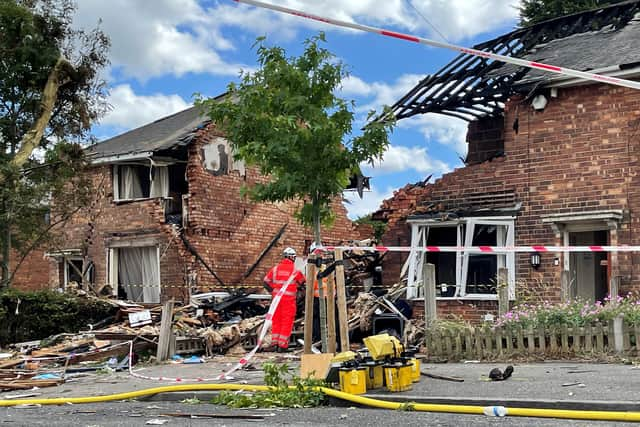Birmingham house explosion: how common are gas leak blasts?
This article contains affiliate links. We may earn a small commission on items purchased through this article, but that does not affect our editorial judgement.
and live on Freeview channel 276
It’s been concluded that the likely cause of the fatal Kingstanding house explosion on Sunday (26 June), was a gas leak from internal piping.
The devastating blast killed 79-year-old grandmother Doreen Rees-Gibb, while her partner and the owner of the house David Murphy was taken to hospital, where he remains in a stable, but critical condition.
Advertisement
Hide AdAdvertisement
Hide AdIn a statement, the fire service said that the blast was most likely caused by an ‘accidental ignition of a large escape of gas from a joint in the pipework.’


According to figures from the Health and Safety Executive (via The Guardian) there were 12 other fatalities and 179 injuries caused by gas explosions and fires in Great Britain in the past five years.
On average, there have been 31 gas explosions a year.
Explosions and fires caused by gas leaks rose from 28 in 2017 to 41 in 2020 and 178 people were injured in the last five years from flammable gas blasts - according to HSE figures.
A ‘number of possible causes’ of gas explosions
Chris Clarke, a partner at Fire Investigations UK, said gas leaks aren’t necessarily uncommon, although there can be a range of other causes.
Advertisement
Hide AdAdvertisement
Hide AdHe said: “It’s quite well known that some internal gas pipes or gas pipes leading up to properties galvanises steel pipes, so it’s not unusual (gas leaks) but there also a myriad of other things which cause gas explosions.
“For exmaple, people working on installations when they’re not qualified to do so - and of course we’ve seen another incident in Bedfordshire, and there’s speculation there that’s another gas explosion. But, there are an infinite number of ignitable gases in people’s houses, and I think a lot of people are not aware that nearly every aerosol can, for example, whether it’s hairspray, polish, or deodorant, is also propelled by liquid petroleum gas.
“There’s enough gas in one of those aerosol cans when it’s mixed with the right percentage of air to cause quite a devastating explosion.


“So we’re very quick to assume that explosions we see in the media must be caused by a gas explosion, and it’s either the fault of the gas board or boiler, but there are a mirriad of other ignitable vapours which will react in the same way. The other thing we come across is petrol vapour explosions.
Advertisement
Hide AdAdvertisement
Hide Ad“Petrol is giving off vapours all the time and anything above 40 degrees is giving vapours off, and those vapors are not dissimilar from propane or butane. So when mixed correctly with air, they create an explosive atmosphere, and significant explosive atmospheres.”
A message from the editor:
Thank you for reading. BirminghamWorld is Birmingham’s latest news website, championing everything that is great about our city - reporting on news, lifestyle and sport. We want to start a community among our readers, so please follow us on Facebook,Twitter and Instagram, and keep the conversation going.
Comment Guidelines
National World encourages reader discussion on our stories. User feedback, insights and back-and-forth exchanges add a rich layer of context to reporting. Please review our Community Guidelines before commenting.
